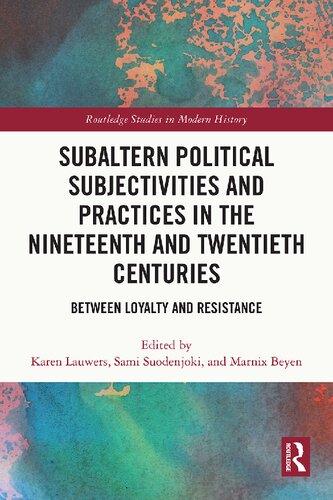

Most ebook files are in PDF format, so you can easily read them using various software such as Foxit Reader or directly on the Google Chrome browser.
Some ebook files are released by publishers in other formats such as .awz, .mobi, .epub, .fb2, etc. You may need to install specific software to read these formats on mobile/PC, such as Calibre.
Please read the tutorial at this link: https://ebookbell.com/faq
We offer FREE conversion to the popular formats you request; however, this may take some time. Therefore, right after payment, please email us, and we will try to provide the service as quickly as possible.
For some exceptional file formats or broken links (if any), please refrain from opening any disputes. Instead, email us first, and we will try to assist within a maximum of 6 hours.
EbookBell Team

5.0
80 reviewsApproaching subalternity from a broad Gramscian angle, this edited collection contributes to the understanding of popular politics in parliamentary, autocratic, and colonial contexts.
The book explores individual stories and micro-histories of complaints, requests, rumors, and other mediated and unmediated interactions between political institutions and the subjects they claimed to govern or represent. It challenges the approaches of institutionally oriented political historiography and its attention to the top-down construction of political representation, citizenship, and power and powerlessness. The book discusses more subtle forms of agency and the spaces these pertained to, which could indicate contestation or resistance taking place within a framework of loyalty towards the existing political institutions. This research does not only bridge the divide between political and apolitical frames of reference, but it also provides a new perspective on the dichotomy between loyalty and resistance by acknowledging the nuances of these seemingly opposing stances. With case studies from Europe, North Africa, South America, and India, the chapters cover political communication in proto-democratic, democratic, imperial, and authoritarian contexts.
This volume is crucial reading for undergraduates, postgraduates, and scholars in history and social sciences who are interested in political culture and the mechanisms of negotiating local, national, or imperial identities.
Chapter 4 of this book is freely available as a downloadable Open Access PDF at http://www.taylorfrancis.com under a Creative Commons Attribution 4.0 International (CC-BY) 4.0 license.